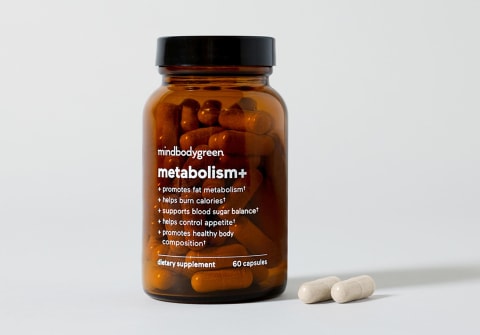Advertisement
Green Tea Regulates Blood Sugar Balance & Promotes Healthy Insulin Levels


It's no secret that many Americans struggle to maintain healthy blood sugar levels, including individuals with diabetes (which make up over 10% of the U.S. population, per the CDC).
Luckily, a certain antioxidant-rich beverage can help the body modulate healthy blood sugar balance and improve insulin sensitivity. (Bonus: It's exceedingly common in many countries and cultures!)
If you haven't guessed already, we're talking about green tea here.
How green tea promotes glucose control & insulin sensitivity
First, a little science: The hormone insulin is required to help regulate blood sugar balance, but cells can become resistant to it over time when faced with excess blood glucose. In these cases, the pancreas stops producing insulin, which can result in even higher blood sugar levels—and, ultimately, prediabetes or Type 2 diabetes.
In a 2017 meta-analysis of 17 randomized controlled trials (RCTs) from the American Journal of Clinical Nutrition, scientists found that green tea consumption significantly decreased fasting glucose and fasting insulin concentrations1, as well as HbA1c levels (i.e., an individual's average blood sugar levels over two or three months).
In other words, adding green tea to your wellness routine can help you maintain a healthy blood sugar balance and promote insulin sensitivity.
For those with prediabetes or diabetes, this is a simple and effective way to promote healthy glucose control and support overall metabolic well-being. For those who simply have a family history of the chronic disease, drinking more green tea could be part of a prevention strategy—not only for diabetes but for other illnesses as well (e.g., cancer and heart disease), thanks to its high antioxidant content.
Adding green tea to your well-being routine
Drinking sencha, matcha, and other types of green tea is an obvious way to up your green tea intake and reap its health benefits. However, green tea extract—i.e., from supplements—is another viable solution for increasing your green tea intake. In fact, the results of the American Journal of Clinical Nutrition meta-analysis showed that both green tea and green tea extract improve glucose control and insulin sensitivity.
If drinking matcha every day isn't your cup of tea (pun intended), you may want to consider a metabolism supplement that specifically addresses metabolic health and well-being. If you need some guidance, mindbodygreen's roundup of best metabolism supplements features a number of products that include green tea extract. (You can check them out here.)
The takeaway
Evidence shows that green tea (as a beverage and in supplement form) can be a helpful tool in maintaining healthy blood sugar balance and reducing insulin resistance.
The next time you're pondering what to order at your favorite coffee shop, consider swapping your usual latte for blood-sugar-balancing matcha, or take green tea extract in supplement form!



















